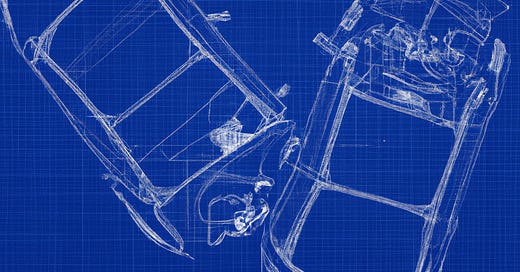
Stoic Meditation #9 - Forgiving Others
In order for forgiveness to happen, something has to die. If you make a choice to forgive, you have to face into the pain. You simply have to hurt. - Brené Brown
"Tout comprendre c'est tout pardonner."
"To understand all is to forgive all," a phrase generally attributed to Blaise Pascal. The idea is that if you know all the circumstances about someone's behavior you can find a way to forgive them. I've found this to be generally true.
Forgiving someone for a particular action used to be a no-go zone, ill-equipped as I was for understanding emotions other than anger and resentment. These two emotions along with a reflexive strength for inventing and holding grudges were learned at my father's knee. Finding a way to escape from these debilitating chains was no easy task and made for hundreds of hours of painful Zazen and awkward Aikido.
The way I think of it, there are two broad types of forgiveness, each with it's own spectrum of actions that can or cannot be forgiven: Forgiving others and forgiving ourselves. I'd like to speak to the former in this post.
It's common that among the others we would do well to forgive are our parents. They can also be some of the most difficult to forgive. This was certainly true in my case. I'd long understood the circumstances and mechanisms behind their blunt approach to parenting and confusing expressions of love. But this understanding created more distance than forgiveness. Once I'd experienced unconditional love with my first wife and her family, the very thought of spending time around my parents and the people who unconsciously ran the patterns they taught was anathema to me. Forgiving them was conditional, incomplete.
It was a simple statement by Brené Brown that made unconditional forgiveness possible. "People can't give you what they don't have." This struck like a lightning bolt from a spring thundercloud - fresh, clear, precise, and unambiguous. In a flash, I was able to forgive the abuses and slights perpetrated by my parents. The unconditional love I found when I was married was something they simply didn't have within themselves to give in a way I learned others could.
This has become a good benchmark for whether or not I understand enough about someone's actions to forgive them. Once I understand they lack a particular skill, trait, or ability, it’s much easier to forgive them. This doesn't mean I will ever trust them again.
There is, to be clear, a range at the extremes for which I either cannot forgive or I haven't the stomach to understand such that I could forgive the behavior. Reflecting on a number of examples in the context of Brené Brown's insight, without exception the perpetrators had both the skill and the awareness to know what they were doing was causing harm to someone vulnerable.
My position on the extremes isn't because I believe forgiveness is not possible in these cases, rather forgiveness isn't mine to give. The issue may be egregious actions against others or myself. In such cases, trust is irrevocably broken and the healthiest strategy is to actively find ways for excluding the offender(s) from our life.
"We do not often live with the superior side of the man—that is generally expressed in his work—but more habitually with his weak, tired, shadow side. We indulge him, restore him, and though we exploit him (that is a mutual game) it often seems to us our role and fate to deal with his inferiority, and conceal it from him. We may do it with wisdom and grace, but usually we project our faults onto each other, all can be beneath comment, and there are times when only mutual forgiveness makes us fit to face each other once more."
Florida Scott-Maxwell
First understand. Then forgive. Then let go.
Non Sequitur
For years my tag line as an Agile Coach has been "Taking Agile into the wild." That is, out of the confines of software development and into the wider world where it occurs naturally in bits and pieces. So here, for your enjoyment and edification, is rare video of a team of bears conducting a sprint planning session.
If you have any questions, need anything clarified, or have something else on your mind, please use the comments section or email me directly.
Photo credit: The author.












